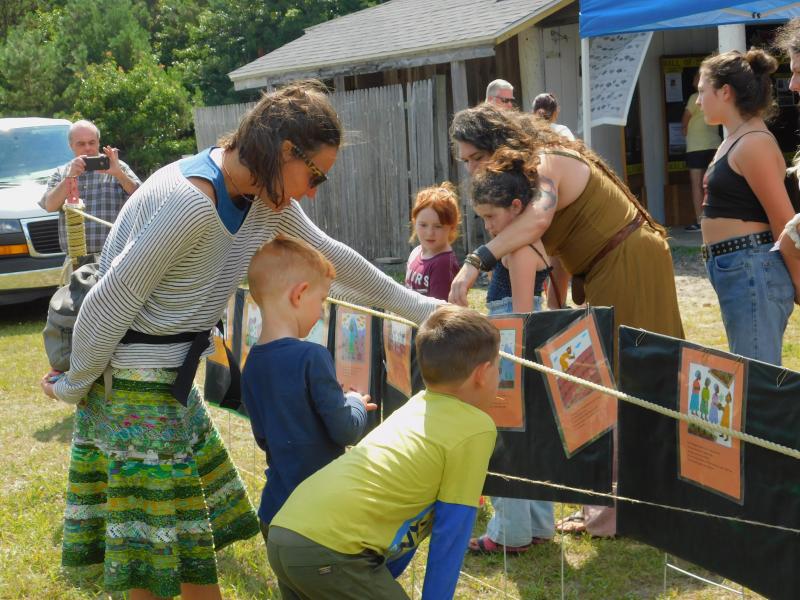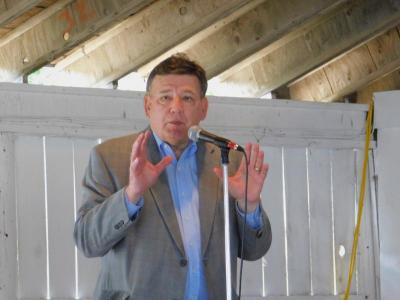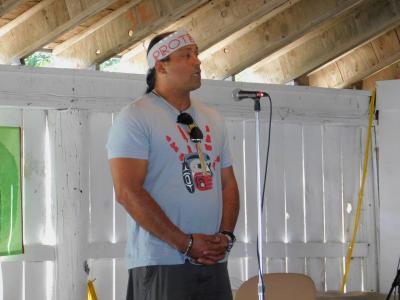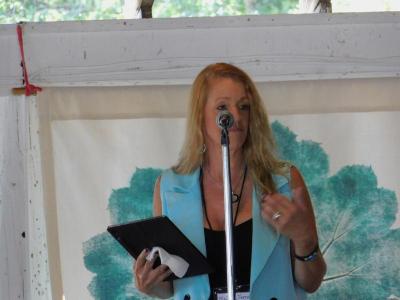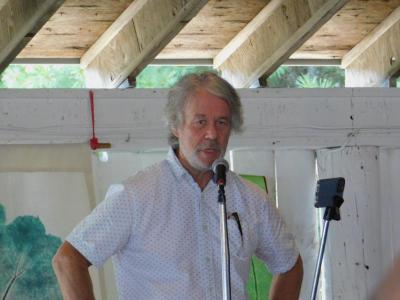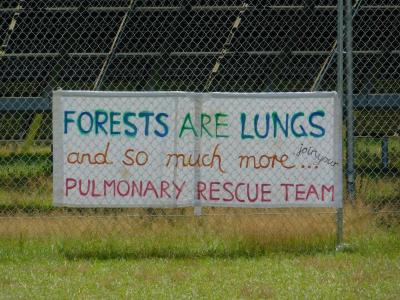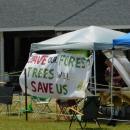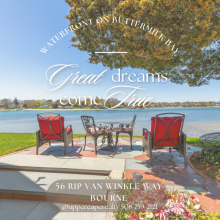Crowd gathers to support environmental protections
A large crowd of people of all ages gathered at the Onset VFW on Saturday afternoon to show support for protecting the environment by limiting solar development on previously undeveloped land.
The event — held at the same time as a rally in Western Massachusetts — was organized by the Herring Pond Wampanoag Tribe, Save the Pine Barrens, and Save Massachusetts Forests. Local supporters include the Community Land and Water Coalition and the Wareham Land Trust.
The event opened with drumming by Sam Holmstock, and free pizza and ice cream added to the festive atmosphere.
Children read picture books and worked on crafts as adults chatted while perusing booths hosted by local activists.
After everyone had a chance to snack on pizza, a series of speakers took the stage beneath the pavilion to address the crowd, garnering bursts of applause in agreement throughout the speeches.
Melissa Ferretti, Chairwoman of the Herring Pond Wampanoag Tribe, spoke first. She began with a land acknowledgement — a statement reminding the members of the crowd that they stood on land the Wampanoags have inhabited for thousands of years.
“Today, our tribal community continues the work of our ancestors: protecting the land and water for our youth and our future generations,” Ferretti said.
Ferretti herself was born in Wareham and grew up nearby. She said that she was raised following Wampanoag traditions, and learned how to fish, hunt, gather, and fully appreciate the land.
“We know the land, water, and wildlife are our relatives, to whom we have a responsibility,” Ferretti said.
She said that the Wampanoag people have seen their land exploited for resources since the arrival of the Pilgrims, and that the future of the land is directly connected to Massachusetts laws governing land use.
Ferretti explained that as indigenous peoples, the Wampanoags should be consulted in good faith ahead of projects that impact tribal lands — as is codified in the United Nations Declaration of the Rights of Indigenous Peoples, which was supported by the United States.
Currently, she said, many state subsidies encourage the kind of large-scale solar development that requires clearcutting forests.
David Weeden, a member of the Mashpee Wampanoag Tribal Council, echoed Ferretti’s frustration with the type of solar projects that are currently being built in Massachusetts. He pointed out that forests are carbon sinks — meaning they absorb and store carbon — making them an important tool in the fight against climate change.
Weeden also emphasized the Wampanoag’s connection to the land. There is documented evidence that Wampanoag people have been living in the region for more than 15,000 years.
Weeden said that long coexistence with the environment was possible because of the Wampanoag’s longstanding cultural and environmental practices:
“We lived sustainably. We learned from the environment,” Weeden said. “Our law was the natural law. We lived in coexistence with everything around us, as we recognized that we were reliant on each other.”
Weeden said that his culture recognizes that people don’t own the land, but borrow it from future generations.
Despite hundreds of years of colonial abuses of the land, Weeden said it’s not too late to make changes to protect the environment.
“There’s very little [undisturbed] land left,” Weeden said. “We need to share this place with everyone.”
Senator Marc Pacheco spoke, first saying he agreed with everything Ferretti and Weeden had said. He said that climate change is “the emergency of our time.”
In addition to technology, Pacheco said, we need to invest in the natural world by expanding forests and developing regenerative farming practices.
“There is no more time to waste,” Pacheco said, citing climate change disasters like rampant forest fires in the western United States and floods around the globe.
Rather than subsidizing solar farms on clearcut forested land, Pacheco said those subsidies should go to putting solar on buildings or over parking lots. Planting trees — which will become carbon sinks — should be a high priority.
Pacheco said that he is in agreement with the activists present at the rally, but that not all politicians are. He encouraged people to reach out to his office or to Meg Sheehan of the Community Land and Water Coalition to find out how to testify during hearings at the state level about climate-related bills.
“The more that your voices are heard, the more we have an opportunity to get the right thing done,” Pacheco said.
He also urged people to make their voices heard wherever possible — on talk radio, by submitting letters to the editor, or at local hearings.
“[Climate change] becomes a priority when you demand it,” Pacheco said.
Frank Mann of Save the Pine Barrens encouraged people to be thoughtful about the impact of their own choices — what car to drive, where to live, etc.
Mann, a member of the Plymouth Planning Board, also urged people to get involved by attending local board meetings, running for a seat, participating in elections, or submitting bylaws to Town Meeting. He said the people of Wareham proved the power of their voices when a record turnout of voters knocked down a proposal by the Notos Group at Town Meeting this spring — a proposal supported by the majority of town leaders.
“That same block of voters could change the town permanently,” Mann said.
The organizers of the event are gathering signatures for a temporary moratorium on large-scale solar developments in Massachusetts. The moratorium would give legislators and towns time to develop new laws to protect the environment. That petition is available here.



